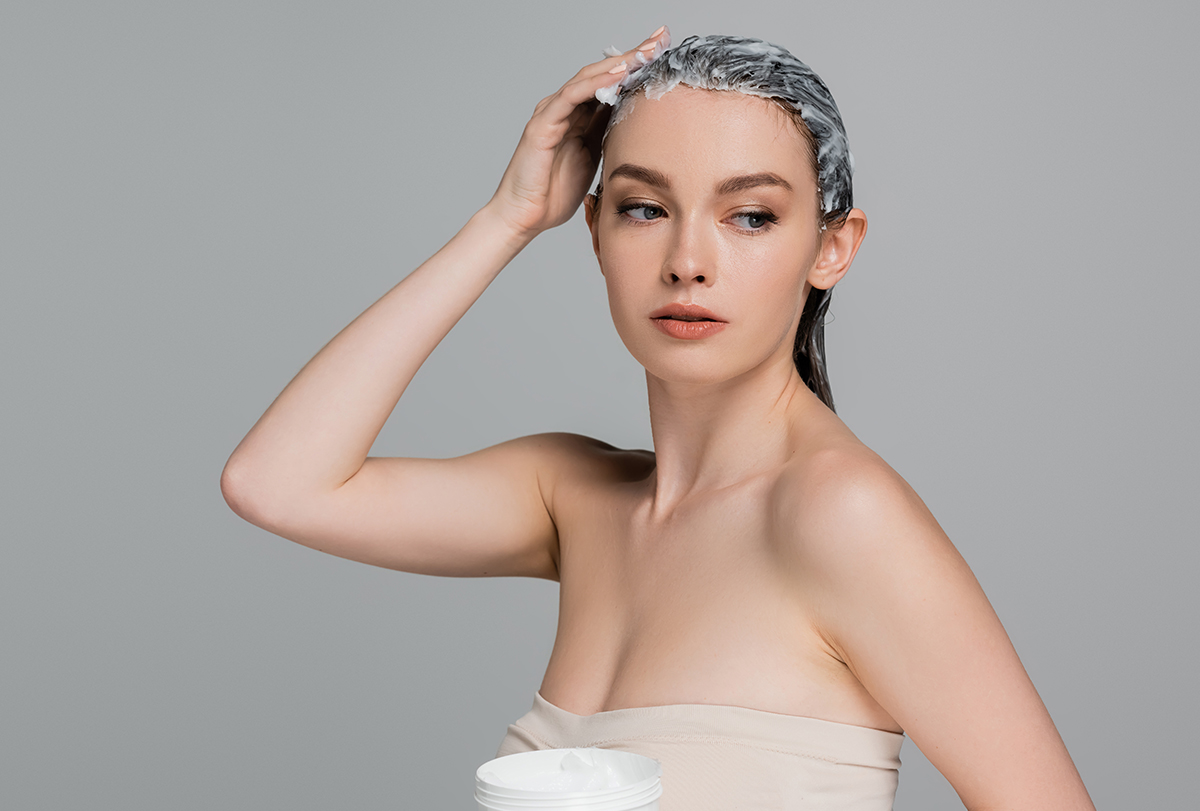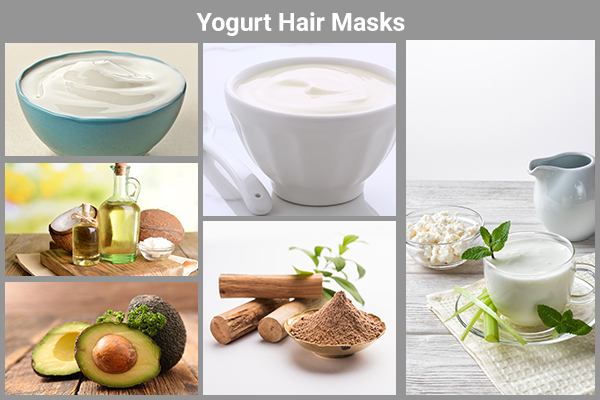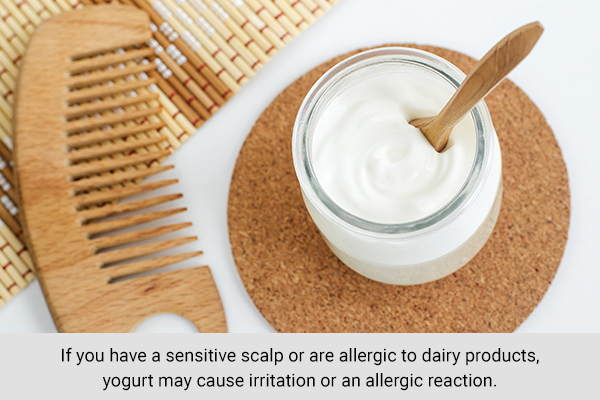In this article:
Herbal products and home remedies are widely and commonly used worldwide to address cosmetic and dermatological problems. One such remedy is the use of yogurt on the hair to treat scalp and hair issues such as:

- Hair damage
- Hair loss
- Rough hair endings or split ends
- Dry, frizzy, lusterless hair
Although the advantages of applying yogurt to your hair are yet to be studied clinically, there is anecdotal evidence that supports its beneficial effects on hair health. (1)
Yogurt is a rich source of protein and vitamin B5. The protein content helps to make the hair fiber strong. Yogurt is applied to the roots of the hair and along the length of your strands and left for 20–30 minutes.
Natural remedies are still used very commonly today for the treatment of scalp and hair disorders or for cosmeceutical purposes. Milk products such as yogurt are one of the most commonly used ingredients in cosmetic remedies by rural women. (2)
Applying Yogurt Masks to Hair

Here are some tried and tested ways to apply yogurt masks to your hair.
1. Yogurt + coconut oil + avocados
The best way to incorporate yogurt into your hair care routine is by using it as a mask with coconut oil and avocados. Avocados are rich in fatty acids and proteins, and coconut oil deeply moisturizes dry hair and promotes scalp health.
Yogurt also aids hair health, giving you shiny, healthy, and bouncy strands. (3)(4)(5)
How to use:
- Mash avocados and mix them with yogurt.
- Add coconut oil to the avocado-yogurt mixture and blend (if the coconut oil is hard, let it soften a bit before use).
- Apply the mask to the roots of your hair and along the length of your strands.
- Leave the mask on for 15–20 minutes and shampoo as usual.
2. Yogurt + sandalwood powder
Applying a paste made with yogurt and sandalwood powder to the scalp can be helpful in treating scalp infections of fungal origin. This mask should be kept on the hair for 20 minutes to reap the benefits. After which, you can wash your hair as usual with a gentle shampoo. (6)
3. Topical probiotics
Yogurt is one of the best sources of probiotics. So, you can use topical probiotics or yogurt directly on your hair to reap its benefits.
Studies have shown that fungal infections and an overgrowth of yeast on the scalp can result in dandruff and seborrheic dermatitis. Research has revealed the use of topical probiotics for this condition to be beneficial, although more research is required. (7)
Benefits of Yogurt on Hair
Some notable benefits of yogurt when applied to the hair include:
- Yogurt is a natural remedy for dandruff control.
- Yogurt is used as a Middle Eastern remedy to treat and reduce hair damage.
- Yogurt is used as a remedy to promote hair growth. (8)
How to Use Yogurt for Oily Scalp?
To apply yogurt alone to your hair to fight oily scalp, follow these steps:
- Choose plain, unsweetened yogurt. Avoid any yogurt that has added sugars, flavors, or additives.
- Take about ½ cup of yogurt, and apply it directly to your scalp. You can use a brush or your fingers to spread it evenly.
- Massage the yogurt into your scalp for a few minutes, making sure to cover the entire scalp area.
- Leave the yogurt on your scalp for 20–30 minutes. If you have long hair, you can tie it up into a bun or wear a shower cap to prevent the yogurt from dripping.
- Rinse the yogurt off your scalp with lukewarm water. You can use a gentle shampoo and conditioner if you wish.
- Repeat this process once or twice a week to maintain a healthy scalp and reduce oiliness.
Note that yogurt can be a little messy to apply, so make sure to wear old clothes or put a towel over your shoulders to protect your clothing. Additionally, if you have any allergies or sensitivities to dairy products, it’s best to avoid using yogurt on your hair.
What Type of Yogurt Is Best for All Hair Types?
Yogurt can help improve hair health. When it comes to choosing the best type of yogurt for the hair, plain, unsweetened, and unflavored yogurt is the best option, according to experts.
Can I Leave Yogurt in My Hair Overnight?

Leaving yogurt in your hair overnight may have some benefits, but according to professionals, doing so can lead to some potential risks.
For example, if you have a sensitive scalp or are allergic to dairy products, yogurt may cause irritation or an allergic reaction. Additionally, leaving any product in your hair for too long can cause buildup and can make your hair feel heavy and greasy.
Ultimately, whether or not you should leave yogurt in your hair overnight will depend on your individual hair type and needs. If you’re unsure, it’s always best to speak with a dermatologist or hair care professional for personalized advice.
Most-Asked Questions About Using Yogurt on Hair
Does yogurt dry out hair?
No, yogurt doesn’t dry out the hair. It, in fact, nourishes and moisturizes the hair and scalp, as claimed by many hair care experts.
How often should I put yogurt in my hair?
Applying yogurt to the hair once weekly is good enough to reap its benefits.
Who should not use yogurt on the hair and scalp?
According to healthcare professionals, the following people should first speak with their doctor or a professional before using yogurt or any other home remedy:
- People with dairy allergies: Yogurt is made from milk, so people with dairy allergies should avoid using it on their hair and scalp. If you have a severe allergy, coming in contact with yogurt can cause an allergic reaction.
- People with sensitive skin: If you have a sensitive scalp or skin, yogurt may cause irritation or redness. It is important to patch test first by applying a small amount of yogurt to your skin and waiting for a few hours to observe if any reaction occurs.
- People with scalp conditions: If you have a scalp condition such as psoriasis or eczema, you should consult with a dermatologist before using yogurt on your scalp.
Final Word
Yogurt is a natural conditioner that is rich in probiotics or healthy microbiota that promotes hair health and helps your hair keep its natural texture. Yogurt application will also give your hair the shine you desire.
- Was this article helpful?
- YES, THANKS!NOT REALLY


